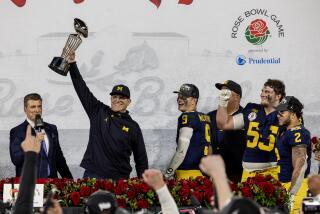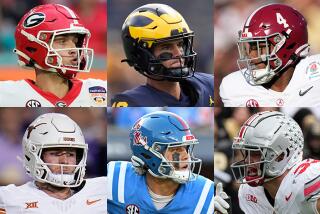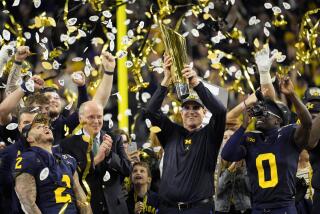NATIONAL-TITLE SHARING 101
MIAMI — Splits happen.
Not even a No. 1 vs. No. 2 in a national title game can prevent college football from having two champions.
“Share?” Florida State quarterback Chris Weinke asked. “We’ll share . . . as long as we get ourselves a championship.”
If Miami beats Florida in the Sugar Bowl on Tuesday night, and Florida State beats Oklahoma in the Orange Bowl the next night in the BCS’ title game, there’s a good chance there will be split national champions for the fourth time since 1990.
Here’s why:
In the two polls that crown champions--The Associated Press media poll and the coaches’ poll--Oklahoma, Miami and Florida State were 1-2-3 going into the bowl games. But under an agreement between the Bowl Championship Series and the American Football Coaches Association, the coaches’ poll automatically declares the Orange Bowl winner its champion. The sports writers and broadcasters in the AP poll vote independently.
In the final BCS standings, Oklahoma (12-0) finished first, Florida State (11-1) second and Miami third (10-1), even though the Hurricanes beat the Seminoles 27-24 on Oct. 7.
Florida State won over Miami in the computer rankings component of the BCS standings, which uses the AP media poll and the coaches’ poll, eight computer rankings, strength-of-schedule and number of losses to determine who plays in its title game.
A casual survey of 20 of the 71 AP poll voters revealed many would vote for or seriously consider Miami as national champs if the Hurricanes and Seminoles win their bowl games.
“If Miami’s win is not a flukey one, and Florida State’s was something less than dominating, I’d vote for Miami,” says AP voter Gary Long of The Miami Herald.
AP voter Andrew Bagnato of The Chicago Tribune says: “If Miami and Florida State both win, I won’t hesitate to make Miami No. 1. One of the beauties of college football is that the regular season still matters.”
Mark Blaudschun of The Boston Globe adds: “I would vote for Miami over Florida State, but would have to weigh in with what Washington did.”
Washington (10-1), fourth in the polls and BCS standings, beat Miami 34-29 in early September and plays Purdue in the Rose Bowl on Monday.
Miami coach Butch Davis can only hope the Hurricanes are in position to claim a piece of the championship.
“You can’t predict how other people are going to vote and how people are going to see it,” he said. “Whatever’s going to happen is going to happen. We’ve just got to make sure we take care of our business and win the game.”
John Swofford, BCS coordinator and commissioner of the Atlantic Coast Conference, has said the BCS minimizes the chance of split national champions, but hasn’t eliminated it.
“We are all agreed on this system,” he says. “Is it perfect? No. But I’m not sure anything is perfect.”
All this hubbub becomes moot, of course, if Florida beats Miami or Oklahoma defeats Florida State to complete a perfect season and win its first national title since 1985. The Gators are six-point underdogs, the Sooners are 12-point underdogs.
Because school presidents are against a playoff for major college football, there’s always a chance for season-ending confusion. However, there are not many voices screaming that having split champions is a bad thing.
“I’ve got no problem with a split,” says Grant Teaff, executive director of the AFCA. “It can happen this time because of the AP poll. We’ve had splits before.”
Roy Kramer, the brainchild of the BCS formula and commissioner of the Southeastern Conference, has often said arguing over who’s No. 1 is great for the sport.
In two of the last three splits--in 1990 and 1997--the No. 1 team in the coaches’ poll dropped despite winning its bowl game. In the other split--in 1991--two teams were tied at No. 1 in the coaches’ poll entering the postseason.
In the AP poll, the pre-bowl No. 1 team in ‘90, ’91 and ’97 came away with the national title by winning its bowl game.
The first two years of the BCS produced no argument over title-game matchups, with Tennessee beating Florida State in the Fiesta Bowl for the ’98 title, and Florida State beating Virginia Tech in the Sugar Bowl for the ’99 championship. In both cases, the teams were ranked 1-2 in both polls and in the BCS standings.
The BCS includes six major conferences--ACC, Big East, Big Ten, Big 12, Pac-10 and SEC--and four bowls--Orange, Sugar, Rose and Fiesta. The six conference winners, plus two at-large teams are chosen for the four games, with only the top two finishers in the BCS standings automatically matched in its title game.
Before the BCS, there was no designated title game and the Big Ten and Pac-10 champs were still under contract to play in the Rose Bowl, which greatly reduced the chances of a 1 vs. 2 game.
In ‘97, Michigan and Nebraska were undefeated and ranked 1-2 in the polls entering their bowl games. Michigan, the Big Ten champs locked into the Rose Bowl, beat Washington State, while Nebraska beat Tennessee in the Orange Bowl. The Wolverines stayed No. 1 in the final AP poll; the Cornhuskers moved up to No. 1 in the final coaches’ poll. The sentiment at the time was fellow coaches thought Tom Osborne deserved a piece of the title in his final season.
In ‘91, Miami was No. 1 in the AP poll and tied with Washington for No. 1 in the coaches’ poll. Miami beat Nebraska in the Orange Bowl; Washington beat Michigan in the Rose Bowl. The Hurricanes were AP’s national champions, while the Huskies won in the coaches’ poll. At the time, there were questions raised about Miami’s decision to stay home and play the lower ranked Huskers instead of higher-ranked Florida in the Sugar Bowl.
In ‘90, Colorado and Georgia Tech were 1-2 in the polls, and both won their bowl games--the Buffaloes beat Notre Dame in the Orange Bowl; the Yellow Jackets beat Nebraska in the Citrus Bowl. Colorado was AP’s national champion, but Georgia Tech was the top choice in the coaches’ poll. An argument for Tech grabbing a share of the title was that the Irish would have beaten the Buffs on a late-game punt return for a TD, but a penalty nullified the play.
More to Read
Go beyond the scoreboard
Get the latest on L.A.'s teams in the daily Sports Report newsletter.
You may occasionally receive promotional content from the Los Angeles Times.










